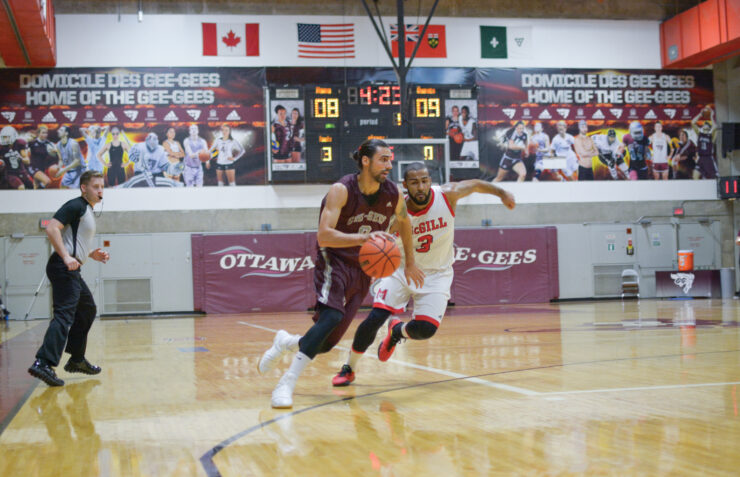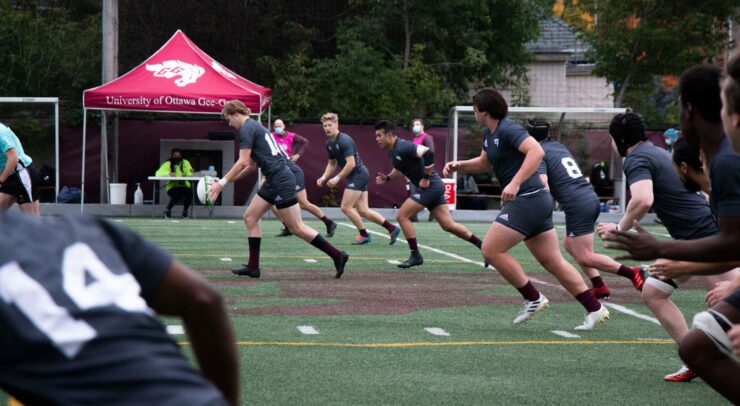WHO YOU GONNA CALL? I AIN’T AFRAID OF NO GHOST MATH.
Are you troubled by strange noises in the middle of the night? Do you experience feelings of dread before or during your studies? Have you or any of your family ever seen a math-anxious student? If you’ve answered ‘yes’ to any of these questions, don’t wait another minute: pick up the phone and call the professionals.
Erin Maloney, a psychology professor at the University of Ottawa, sat down with the Fulcrum to talk about her research. It was described as, ”the intersection of cognition and emotion, as it pertains to academic achievement.”
On the cognitive side, they are looking at spatial skills and different types of memory as opposed to the emotional side, which examines anxiety, stereotypes and their effects in the classroom. Maloney examines the types of factors that influence people’s performance in math and science — one of which is known as math anxiety.
What is math anxiety?
According to Maloney, math anxiety refers to feelings of fear, tension or apprehension that many people tend to feel when they’re engaging with math.
“When you’re anxious about math, you tend to do worse, but it’s not just that people who are anxious in math are bad at math. It’s actually that the anxiety itself can cause you to do worse,” said Maloney.
Now consider a situation in which you’re feeling anxious, whether in math or something else. Oftentimes negative emotions or ruminations will arise, and the anxiety co-opts important memory resources that would otherwise be used for something like a math test.
“On the flip side, we also know that people who are really anxious about math tend to avoid
math classes and opportunities to really hone those math skills. So. over time, you do end up
being a little bit less skilled than your peers and students who are anxious about math are less
likely to do their math homework. So, I think you end up getting this snowballing effect,” explained Maloney.
How to alleviate math anxiety?
When asked about possible ways to mediate math anxiety, Maloney said, “what you want to do is target both the anxiety and the math achievement. So, for targeting anxiety, you can do things
like mindfulness type interventions — like focused breathing, or you can do so-called expressive
writing. So, that’s one of my favourite ones, just because there’s some pretty strong evidence to
suggest that it’s really effective.”
According to Maloney, people who practice expressive writing before a math test may begin by writing feelings of stress about performing well on said test, or about the repercussions of reporting a bad grade back to parents. As they continue to write, they tend to re-frame their thinking and realize they have actually been studying hard. Eventually, they’ll start to feel much better about their test.
“The idea is to view the test as a challenge that you have the ability to overcome, rather than viewing it as a threat to your identity,” said Maloney.
In addition, she suggested that those who are feeling anxious about math can practice some breathing exercises.
“Hold up your hand and imagine it’s like a mountain. When you climb up the mountain, you
breathe in, when you go down the mountain, you breathe out, and just kind of tracing your hand
as you do it. And that’s a good way to just draw your attention away from the anxiety for a
minute and calm yourself down, and get that physiological reaction down,” she explained.
The role of parents and math anxiety
“If you’re a child whose parents are really anxious about math, and those parents help you a lot
with your math homework, then you tend to adopt those attitudes too, and you also become
anxious. So there seems to be a bit of a social component at play,” said Maloney.
She continued, “we have some preliminary evidence to suggest that when the parents are
anxious, they might be a little bit more controlling, in terms of how they teach kids to do their
homework. So those parents might be a little bit more likely to actually do the homework for
their child. So, our thought is that it’s probably something about the way that parents who are
anxious are teaching their children.”
Changes being made in schools
In terms of policy implications, the Cognition and Emotion Laboratory is working on developing socio-emotional learning in the classrooms — meaning: teaching students how to regulate and deal with their emotions.
“A lot of these emotion regulation strategies such as the deep breathing and reframing techniques
are all things that I think are being taught now in elementary schools to help children learn how
to handle big feelings. So, that’s certainly not something that was in the Ontario curriculum when
I went through elementary school,” said Maloney.
Throughout Maloney’s research, they’ve found evidence to suggest that if the teachers themselves are anxious, on average their students tend to learn less than students in a classroom with teachers who are not anxious about math.
Final remarks
In addition to regulating our anxiety towards academics, Maloney stressed the importance of practising science-based, effective study techniques, such as spaced repetition and active recall.
Space repetition is a technique that suggests students space out their studying throughout the semester rather than cramming it all in at the end. Active recall — also known as the ‘retrieval practice’ — implores students to practice quizzing themselves or complete practice exams rather than passively re-reading lecture notes.
For more information on Maloney and her research at the Cognition and Emotion Laboratory, visit her website.









